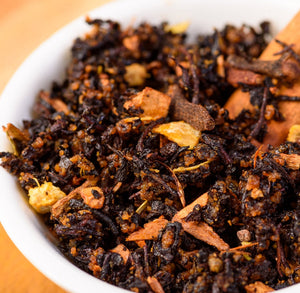At Monk’s Chai, we’ve spent over a decade working at the intersection of specialty chai, specialty coffee, and the hospitality industry. From operating busy cafés to supplying high-volume chai to restaurants and retailers, we’ve seen what happens when quality ingredients are stored right - and what happens when they’re not. We currently run three commercial kitchens and two warehousing facilities, so storage isn’t just something we recommend - it’s something we’ve had to perfect.
Whether you're brewing chai at home or managing inventory for your business, the way you store tea and chai makes a big difference. This guide breaks down exactly how to do it properly - to lock in flavor, preserve aroma, and keep every cup tasting just as good as the first.

What’s the best way to store tea
The freshness of your tea depends on four things: air, light, moisture, and temperature. When tea is exposed to any of these - even slowly, over time - it starts to lose flavor and aroma.
Whether you're storing a delicate green tea or a bold black blend, the basic rule is the same: keep it dry, dark, airtight, and cool.
That means no clear glass jars, no humid kitchen shelves, and no storing tea next to strong-smelling spices. It doesn't matter what your type of tea is, how you store the tea matters just as much as how you brew it.
Explore more: Chai vs Tea: Are They The Same?
Best way to store tea in the fridge
Refrigerating tea often does more harm than good - unless you’re storing brewed tea or sealed, factory-packaged leaves.
Here’s why dry tea doesn’t belong in your fridge:
-
Moisture risk: Temperature changes cause condensation - tea absorbs that moisture fast.
-
Odour exposure: Even sealed containers can pick up food smells.
-
Texture damage: Humidity can cause clumping or make the leaves soft.
When is the fridge okay?
Only when tea is unopened and vacuum-sealed, or when you’ve brewed tea you want to chill and drink within 1–2 days.
Best way to store tea in the freezer
When we talk about freezing tea, we mean unbrewed, dry tea - specifically:
-
Loose leaf tea
-
Tea bags
-
Chai blends (dry spice + tea mixtures)
Freezing can extend shelf life for these types of dry tea if done properly, especially for delicate teas like green or white that degrade faster over time.
If you freeze tea:
-
Use airtight, vacuum-sealed bags or tins
-
Store in small portions so you only defrost what you need
-
Never refreeze after thawing
-
Let it come to room temperature before opening to prevent condensation
What not to freeze:
-
Partially used or opened tea containers (risk of condensation)
-
Tea in glass jars (poor insulation, prone to light exposure)
-
Brewed tea (the flavor and texture degrade after freezing and thawing)
Best way to store loose leaf tea
Loose leaf tea offers the most flavor — but only if it’s stored well. It needs protection from oxygen, light, and kitchen humidity.
The best storage containers are:
-
Opaque tins with tight-fitting lids
-
Stainless steel or ceramic jars (food-grade, not decorative)
-
Resealable, foil-lined bags (often the original packaging)
Avoid:
-
Glass jars, clear containers, or paper pouches
-
Storage near heat sources (e.g. ovens, windows)
Pro tip:
If you buy in bulk, divide the tea into smaller portions and store extras separately to reduce repeated air exposure. And always label with the purchase date - even the best tea fades with time.

What’s best way to store chai for maximum flavour?
Storing chai properly depends on the type of chai you’re working with. A fresh concentrate needs very different care than a dry blend of tea and spices. But the goal is always the same: protect the flavor.
Best way to store chai in the fridge (Fresh vs. Premade vs Chai blend)
Fresh-brewed chai:
-
Let it cool to room temperature, then store in an airtight glass jar or bottle
-
Keep it in the back of the fridge, where the temperature is most stable
-
Use within 5–7 days
-
Avoid plastic containers, which can affect the taste and absorb odors
Explore more: What Does Chai Tea Taste Like?
Premade chai concentrate:
-
Store in the fridge after opening
-
Keep the cap tightly sealed to maintain freshness
-
Shake well before each use - spices and tea tend to settle
-
Check the label, but most should be used within 7–10 days
Dry chai blend (tea + spices)
-
Do not refrigerate
-
Moisture in the fridge can cause clumping and dull the spices
-
Store in a cool, dry cupboard in an airtight, opaque container instead.
Best way to store chai long-term
For long-term storage, chai should be kept in its dry form - that is, tea blended with whole or ground spices. The goal is to prevent moisture, light, air, and strong odors from breaking down the flavor over time.
Blends made with whole spices (like cardamom pods, cinnamon sticks, and cloves) retain flavor longer than ground spice blends, making them ideal for long-term use.
Avoid freezing or refrigerating dry chai - even sealed, it’s prone to condensation and flavor loss.
Will tea and chai ever expire?
Tea and chai don’t expire in the same way perishable foods do, but they lose flavor, aroma, and potency over time. When stored properly - in airtight containers, away from heat, light, and moisture - they remain safe to drink, but their quality slowly fades.
How do I know if my chai or tea has expired?
You’ll usually notice it in the cup:
-
The flavor becomes flat, weak, or unusually bitter
-
The aroma fades or smells dusty
-
The color of the brewed tea may be darker or duller than normal
If you’re questioning it, trust your senses - fresh tea smells alive; old tea smells like paper.

Shelf life of tea and chai
The following shelf life estimates are general guidelines; always check for signs of spoilage, such as off smells or mold, before consumption:
-
Green tea: 6–12 months
-
Black tea: 1–2 years
-
Oolong and white teas: 1–1.5 years
-
Tea bags: Around 8–12 months
-
Dry chai blends (with whole spices): Up to 18–24 months
-
Blends with ground spices: 6–12 months
-
Premade chai concentrate: 7–10 days (refrigerated after opening)
-
Fresh brewed chai: 5–7 days in the fridge
Buying tips for fresher tea and chai
Choose tea or chai sold in airtight, light-blocking packaging - tins or resealable foil bags are ideal. Avoid clear plastic or cardboard boxes unless they’re sealed inside.
Buy smaller quantities you can finish within a few months. Tea and chai lose their flavor over time, especially blends with spices or delicate leaves.
Look for a packaging or blending date on the label. The fresher the batch, the better the aroma and taste - especially with chai blends containing bold spices like cardamom and ginger.
Why Is New Packaging Important For Tea Storage?
For regular Monk's Chai home brewers, you do not have to change the packaging. The store-bought Monk's Chai is reusable and designed to seal in the freshness of our chai signature blend. If you are purchasing a small amount of tea bags that you will consume in under a month, the original packaging will suffice. In conclusion, storing your chai is crucial to ensure that you enjoy the perfect cup of tea every time and keep the good benefits of chai or tea last longer. Remember these steps:
-
Avoid humid areas, loose lids, or flimsy boxes
-
Avoid direct sunlight, moisture and other products
-
Using multi-ply bags with resealable zippers
-
Should not store tea in a refrigerator or freezer


